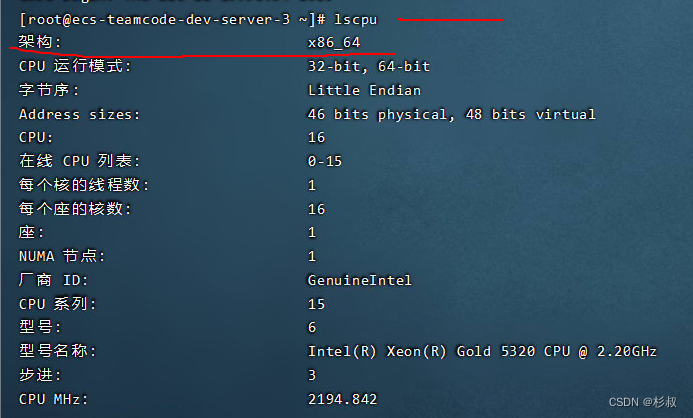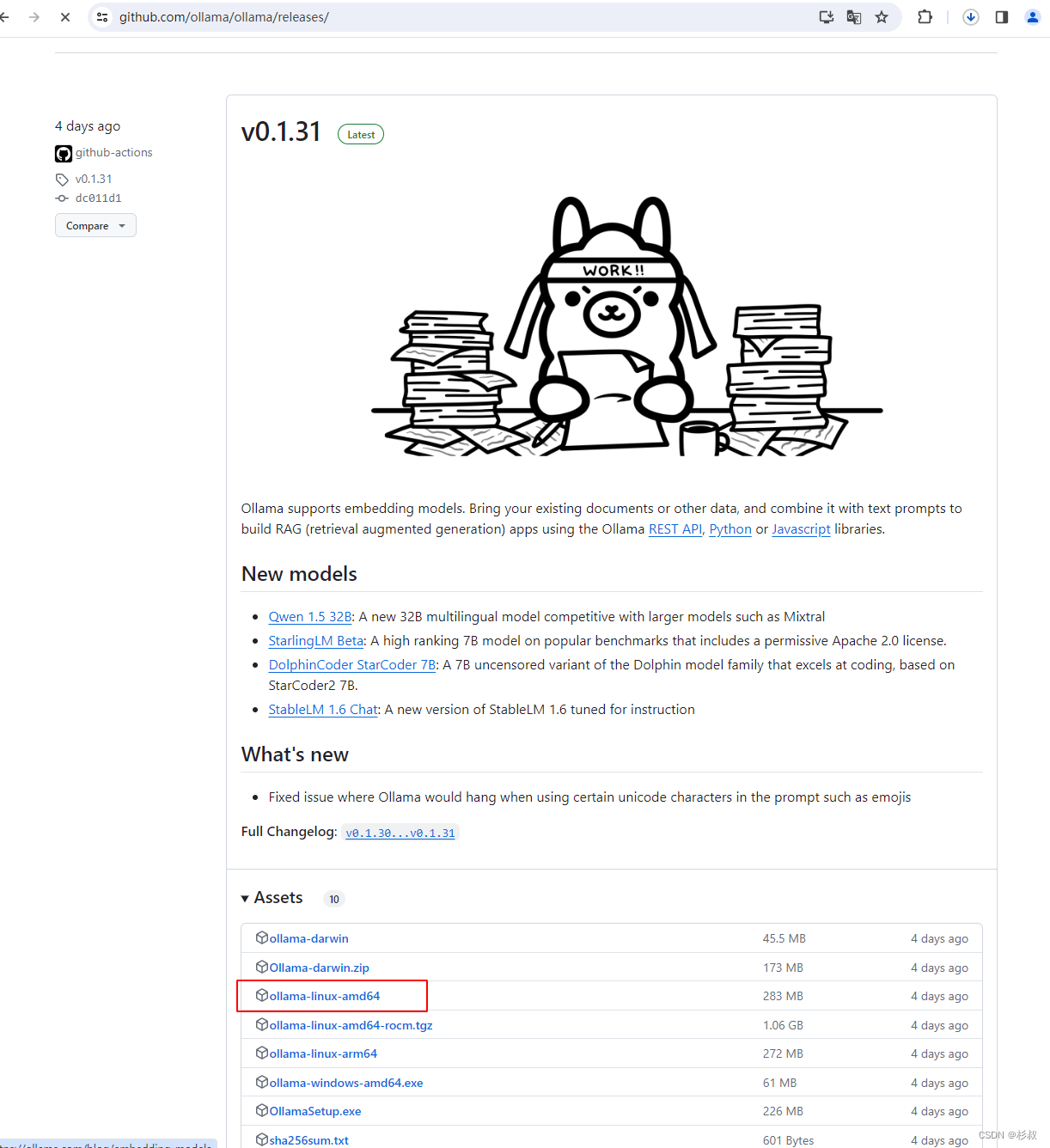1、在线安装
在线安装地址https://ollama.com/download选择服务器系统,按照步骤完成安装
2、离线安装
步骤1:查看服务器CPU的型号
## 查看Linux系统CPU型号命令,我的服务器cpu型号是x86_64lscpu
步骤2:根据CPU型号下载Ollama安装包,并保存到/home/Ollama目录
我下载的是Ollama的v0.1.31版本,后面均以此版本为例说明
下载地址 https://github.com/ollama/ollama/releases/
# x86_64 CPU选择下载ollama-linux-amd64# aarch64|arm64 CPU选择下载ollama-linux-arm64
步骤3:离线下载Linux环境的Ollama安装脚本,并保存到/home/Ollama目录
## 下载地址1,浏览器中打开下面地址https://ollama.com/install.sh## 下载地址2https://github.com/ollama/ollama/blob/main/scripts/install.sh## 国内加速可访问https://gitee.com/ai-big-model/ollama/blob/main/scripts/install.sh步骤4:修改install.sh脚本
总共需要修改两个点,第一:Ollama下载地址;第二:Ollama安装包存放目录
第一处修改,注释下载链接
status "Downloading ollama..."## 在install.sh的第65行#curl --fail --show-error --location --progress-bar -o $TEMP_DIR/ollama "https://ollama.com/download/ollama-linux-${ARCH}${VER_PARAM}"第二处修改,修改ollama安装目录
status "Installing ollama to $BINDIR..."$SUDO install -o0 -g0 -m755 -d $BINDIR## 在install.sh的第73行#$SUDO install -o0 -g0 -m755 $TEMP_DIR/ollama $BINDIR/ollama$SUDO install -o0 -g0 -m755 ./ollama-linux-amd64 $BINDIR/ollama修改后的install.sh文件,v0.1.31版本
#!/bin/sh# This script installs Ollama on Linux.# It detects the current operating system architecture and installs the appropriate version of Ollama.set -eustatus() { echo ">>> $*" >&2; }error() { echo "ERROR $*"; exit 1; }warning() { echo "WARNING: $*"; }TEMP_DIR=$(mktemp -d)cleanup() { rm -rf $TEMP_DIR; }trap cleanup EXITavailable() { command -v $1 >/dev/null; }require() { local MISSING='' for TOOL in $*; do if ! available $TOOL; then MISSING="$MISSING $TOOL" fi done echo $MISSING}[ "$(uname -s)" = "Linux" ] || error 'This script is intended to run on Linux only.'ARCH=$(uname -m)case "$ARCH" in x86_64) ARCH="amd64" ;; aarch64|arm64) ARCH="arm64" ;; *) error "Unsupported architecture: $ARCH" ;;esacKERN=$(uname -r)case "$KERN" in *icrosoft*WSL2 | *icrosoft*wsl2) ;; *icrosoft) error "Microsoft WSL1 is not currently supported. Please upgrade to WSL2 with 'wsl --set-version <distro> 2'" ;; *) ;;esacVER_PARAM="${OLLAMA_VERSION:+?version=$OLLAMA_VERSION}"SUDO=if [ "$(id -u)" -ne 0 ]; then # Running as root, no need for sudo if ! available sudo; then error "This script requires superuser permissions. Please re-run as root." fi SUDO="sudo"fiNEEDS=$(require curl awk grep sed tee xargs)if [ -n "$NEEDS" ]; then status "ERROR: The following tools are required but missing:" for NEED in $NEEDS; do echo " - $NEED" done exit 1fistatus "Downloading ollama..."# curl --fail --show-error --location --progress-bar -o $TEMP_DIR/ollama "https://ollama.com/download/ollama-linux-${ARCH}${VER_PARAM}"for BINDIR in /usr/local/bin /usr/bin /bin; do echo $PATH | grep -q $BINDIR && break || continuedonestatus "Installing ollama to $BINDIR..."$SUDO install -o0 -g0 -m755 -d $BINDIR# $SUDO install -o0 -g0 -m755 $TEMP_DIR/ollama $BINDIR/ollama$SUDO install -o0 -g0 -m755 ./ollama-linux-amd64 $BINDIR/ollamainstall_success() { status 'The Ollama API is now available at 127.0.0.1:11434.' status 'Install complete. Run "ollama" from the command line.'}trap install_success EXIT# Everything from this point onwards is optional.configure_systemd() { if ! id ollama >/dev/null 2>&1; then status "Creating ollama user..." $SUDO useradd -r -s /bin/false -U -m -d /usr/share/ollama ollama fi if getent group render >/dev/null 2>&1; then status "Adding ollama user to render group..." $SUDO usermod -a -G render ollama fi if getent group video >/dev/null 2>&1; then status "Adding ollama user to video group..." $SUDO usermod -a -G video ollama fi status "Adding current user to ollama group..." $SUDO usermod -a -G ollama $(whoami) status "Creating ollama systemd service..." cat <<EOF | $SUDO tee /etc/systemd/system/ollama.service >/dev/null[Unit]Description=Ollama ServiceAfter=network-online.target[Service]ExecStart=$BINDIR/ollama serveUser=ollamaGroup=ollamaRestart=alwaysRestartSec=3Environment="PATH=$PATH"[Install]WantedBy=default.targetEOF SYSTEMCTL_RUNNING="$(systemctl is-system-running || true)" case $SYSTEMCTL_RUNNING in running|degraded) status "Enabling and starting ollama service..." $SUDO systemctl daemon-reload $SUDO systemctl enable ollama start_service() { $SUDO systemctl restart ollama; } trap start_service EXIT ;; esac}if available systemctl; then configure_systemdfiif ! available lspci && ! available lshw; then warning "Unable to detect NVIDIA/AMD GPU. Install lspci or lshw to automatically detect and install GPU dependencies." exit 0ficheck_gpu() { # Look for devices based on vendor ID for NVIDIA and AMD case $1 in lspci) case $2 in nvidia) available lspci && lspci -d '10de:' | grep -q 'NVIDIA' || return 1 ;; amdgpu) available lspci && lspci -d '1002:' | grep -q 'AMD' || return 1 ;; esac ;; lshw) case $2 in nvidia) available lshw && $SUDO lshw -c display -numeric | grep -q 'vendor: .* \[10DE\]' || return 1 ;; amdgpu) available lshw && $SUDO lshw -c display -numeric | grep -q 'vendor: .* \[1002\]' || return 1 ;; esac ;; nvidia-smi) available nvidia-smi || return 1 ;; esac}if check_gpu nvidia-smi; then status "NVIDIA GPU installed." exit 0fiif ! check_gpu lspci nvidia && ! check_gpu lshw nvidia && ! check_gpu lspci amdgpu && ! check_gpu lshw amdgpu; then install_success warning "No NVIDIA/AMD GPU detected. Ollama will run in CPU-only mode." exit 0fiif check_gpu lspci amdgpu || check_gpu lshw amdgpu; then # Look for pre-existing ROCm v6 before downloading the dependencies for search in "${HIP_PATH:-''}" "${ROCM_PATH:-''}" "/opt/rocm"; do if [ -n "${search}" ] && [ -e "${search}/lib/libhipblas.so.2" ]; then status "Compatible AMD GPU ROCm library detected at ${search}" install_success exit 0 fi done status "Downloading AMD GPU dependencies..." $SUDO rm -rf /usr/share/ollama/lib $SUDO chmod o+x /usr/share/ollama $SUDO install -o ollama -g ollama -m 755 -d /usr/share/ollama/lib/rocm curl --fail --show-error --location --progress-bar "https://ollama.com/download/ollama-linux-amd64-rocm.tgz${VER_PARAM}" \ | $SUDO tar zx --owner ollama --group ollama -C /usr/share/ollama/lib/rocm . install_success status "AMD GPU dependencies installed." exit 0fi# ref: https://docs.nvidia.com/cuda/cuda-installation-guide-linux/index.html#rhel-7-centos-7# ref: https://docs.nvidia.com/cuda/cuda-installation-guide-linux/index.html#rhel-8-rocky-8# ref: https://docs.nvidia.com/cuda/cuda-installation-guide-linux/index.html#rhel-9-rocky-9# ref: https://docs.nvidia.com/cuda/cuda-installation-guide-linux/index.html#fedorainstall_cuda_driver_yum() { status 'Installing NVIDIA repository...' case $PACKAGE_MANAGER in yum) $SUDO $PACKAGE_MANAGER -y install yum-utils $SUDO $PACKAGE_MANAGER-config-manager --add-repo https://developer.download.nvidia.com/compute/cuda/repos/$1$2/$(uname -m)/cuda-$1$2.repo ;; dnf) $SUDO $PACKAGE_MANAGER config-manager --add-repo https://developer.download.nvidia.com/compute/cuda/repos/$1$2/$(uname -m)/cuda-$1$2.repo ;; esac case $1 in rhel) status 'Installing EPEL repository...' # EPEL is required for third-party dependencies such as dkms and libvdpau $SUDO $PACKAGE_MANAGER -y install https://dl.fedoraproject.org/pub/epel/epel-release-latest-$2.noarch.rpm || true ;; esac status 'Installing CUDA driver...' if [ "$1" = 'centos' ] || [ "$1$2" = 'rhel7' ]; then $SUDO $PACKAGE_MANAGER -y install nvidia-driver-latest-dkms fi $SUDO $PACKAGE_MANAGER -y install cuda-drivers}# ref: https://docs.nvidia.com/cuda/cuda-installation-guide-linux/index.html#ubuntu# ref: https://docs.nvidia.com/cuda/cuda-installation-guide-linux/index.html#debianinstall_cuda_driver_apt() { status 'Installing NVIDIA repository...' curl -fsSL -o $TEMP_DIR/cuda-keyring.deb https://developer.download.nvidia.com/compute/cuda/repos/$1$2/$(uname -m)/cuda-keyring_1.1-1_all.deb case $1 in debian) status 'Enabling contrib sources...' $SUDO sed 's/main/contrib/' < /etc/apt/sources.list | $SUDO tee /etc/apt/sources.list.d/contrib.list > /dev/null if [ -f "/etc/apt/sources.list.d/debian.sources" ]; then $SUDO sed 's/main/contrib/' < /etc/apt/sources.list.d/debian.sources | $SUDO tee /etc/apt/sources.list.d/contrib.sources > /dev/null fi ;; esac status 'Installing CUDA driver...' $SUDO dpkg -i $TEMP_DIR/cuda-keyring.deb $SUDO apt-get update [ -n "$SUDO" ] && SUDO_E="$SUDO -E" || SUDO_E= DEBIAN_FRONTEND=noninteractive $SUDO_E apt-get -y install cuda-drivers -q}if [ ! -f "/etc/os-release" ]; then error "Unknown distribution. Skipping CUDA installation."fi. /etc/os-releaseOS_NAME=$IDOS_VERSION=$VERSION_IDPACKAGE_MANAGER=for PACKAGE_MANAGER in dnf yum apt-get; do if available $PACKAGE_MANAGER; then break fidoneif [ -z "$PACKAGE_MANAGER" ]; then error "Unknown package manager. Skipping CUDA installation."fiif ! check_gpu nvidia-smi || [ -z "$(nvidia-smi | grep -o "CUDA Version: [0-9]*\.[0-9]*")" ]; then case $OS_NAME in centos|rhel) install_cuda_driver_yum 'rhel' $(echo $OS_VERSION | cut -d '.' -f 1) ;; rocky) install_cuda_driver_yum 'rhel' $(echo $OS_VERSION | cut -c1) ;; fedora) [ $OS_VERSION -lt '37' ] && install_cuda_driver_yum $OS_NAME $OS_VERSION || install_cuda_driver_yum $OS_NAME '37';; amzn) install_cuda_driver_yum 'fedora' '37' ;; debian) install_cuda_driver_apt $OS_NAME $OS_VERSION ;; ubuntu) install_cuda_driver_apt $OS_NAME $(echo $OS_VERSION | sed 's/\.//') ;; *) exit ;; esacfiif ! lsmod | grep -q nvidia; then KERNEL_RELEASE="$(uname -r)" case $OS_NAME in rocky) $SUDO $PACKAGE_MANAGER -y install kernel-devel kernel-headers ;; centos|rhel|amzn) $SUDO $PACKAGE_MANAGER -y install kernel-devel-$KERNEL_RELEASE kernel-headers-$KERNEL_RELEASE ;; fedora) $SUDO $PACKAGE_MANAGER -y install kernel-devel-$KERNEL_RELEASE ;; debian|ubuntu) $SUDO apt-get -y install linux-headers-$KERNEL_RELEASE ;; *) exit ;; esac NVIDIA_CUDA_VERSION=$($SUDO dkms status | awk -F: '/added/ { print $1 }') if [ -n "$NVIDIA_CUDA_VERSION" ]; then $SUDO dkms install $NVIDIA_CUDA_VERSION fi if lsmod | grep -q nouveau; then status 'Reboot to complete NVIDIA CUDA driver install.' exit 0 fi $SUDO modprobe nvidiafistatus "NVIDIA CUDA drivers installed."步骤4:运行 install.sh脚本 ,安装
# 执行installl.sh脚本,需要sudo 权限 chmod +x install.sh./install.sh# 如果报错误权限不足,执行chmod +x install.sh# 如果报错误: bash: ./build_android.sh:/bin/sh^M:解释器错误: 没有那个文件或目录,执行sed -i 's/\r$//' install.sh
步骤5:配置大模型下载目录
# 执行命令vim ~/.bashrc# 配置 OLLAMA_MODELS 环境变量自定义路径### ollama model dir 改为自定义的路径,默认路径/usr/share/ollama/.ollama/models export OLLAMA_MODELS=/home/Ollama/ollama_cache# 复制/usr/share/ollama/.ollama/models目录中(blobs manifests)的文件夹到OLLAMA_MODELS环境变量目录cp -r /usr/share/ollama/.ollama/models /home/Ollama/ollama_cache步骤6:运行大模型,如通义千问
# 需要先将大模型下载到OLLAMA_MODELS文件中# ollama run <模型名称>ollama run qwen步骤7:关闭 Ollama 服务
# 关闭ollama服务service ollama stop